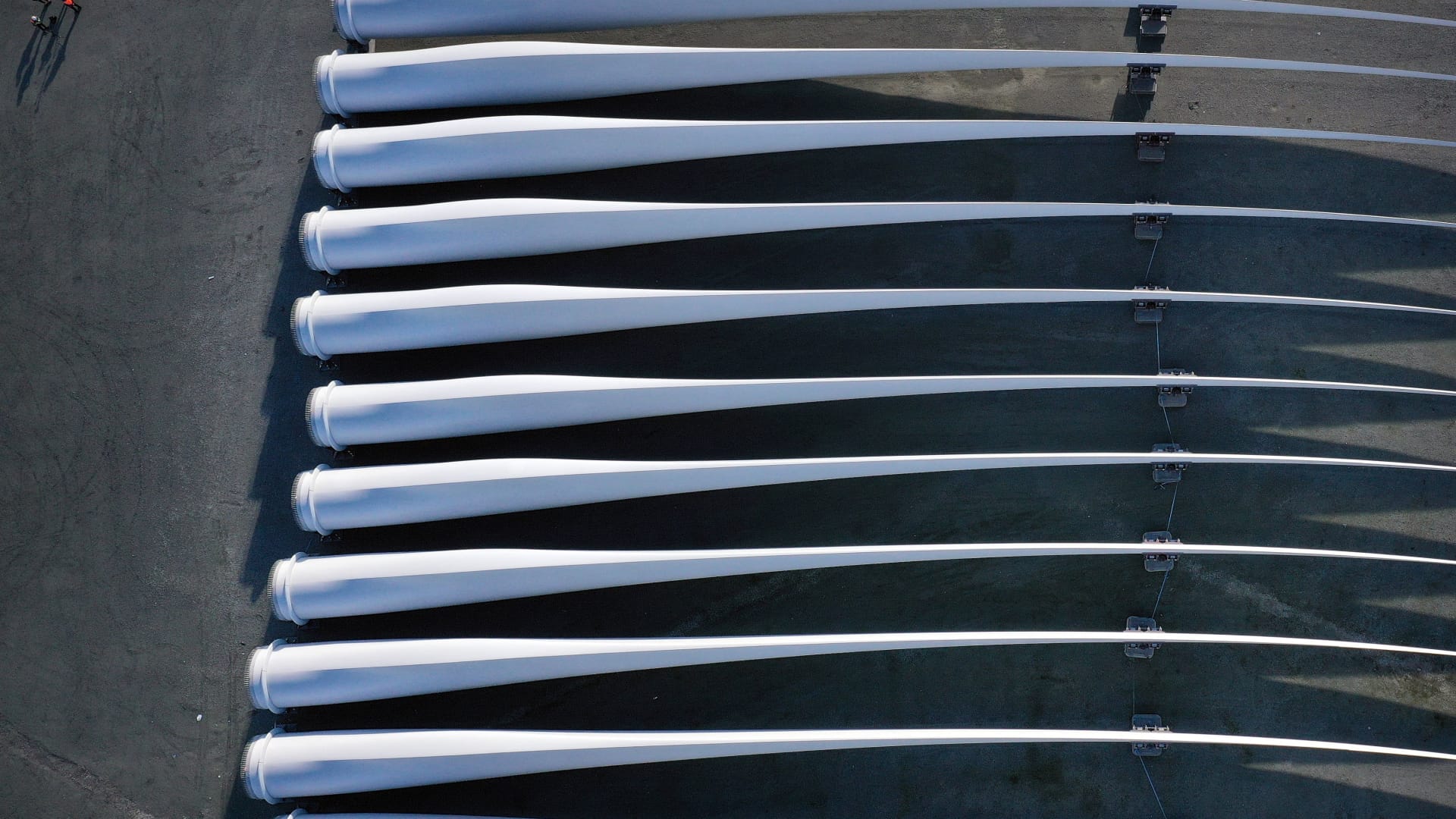Wind turbine blades photographed at a Siemens Gamesa facility in Hull, England, in January 2022.
Paul Ellis | AFP | Getty Photographs
The CEO of Siemens Vitality on Wednesday argued that the vitality transition would fail until his business addressed various points presently dealing with the wind energy sector.
In an interview with CNBC’s “Squawk Field Europe,” Christian Bruch mentioned his agency was “within the coronary heart of the vitality transition” however famous that there have been “challenges in wind” particularly when it got here to provide chains.
“Always remember, renewables like wind roughly, roughly, want 10 instances the fabric [compared to] … what standard applied sciences want,” he mentioned.
“So if in case you have issues on the availability chain, it hits … wind extraordinarily laborious, and that is what we see.”
“And this, sadly, clearly, results in the state of affairs [where] … it impacts the general group outcomes considerably.”
On Wednesday, Siemens Vitality mentioned its “general efficiency” had been “held again by the adverse growth at Siemens Gamesa Renewable Vitality,” a wind turbine producer during which it has a majority stake.
In an announcement, Siemens Vitality mentioned its adjusted earnings earlier than curiosity, taxes, and amortization — and particular gadgets — had fallen to 379 million euros (round $393.8 million) in comparison with 661 million euros for the 2021 fiscal yr.
“Whereas Gasoline and Energy benefited from its turnaround plan and noticed adjusted EBITA rise sharply, the rise was greater than offset by a wider loss at SGRE,” it added. This was “as a result of difficulties within the ramp-up of the 5.X onshore platform in addition to provide chain delays.”
Siemens Vitality posted a internet lack of 647 million euros in opposition to a 560 million euro loss within the earlier yr but in addition reported a report order backlog of 97.4 billion euros.
“Because of the widening loss, and the challenges dealing with the corporate now and within the coming yr, the chief board of Siemens Vitality will recommend to the Supervisory Board to not suggest a dividend for 2022 at its annual shareholder assembly in February 2023,” it added.
New administration has been put in at SGRE — which has confronted a interval of turbulence — and Siemens Vitality on Wednesday additionally referenced its announcement in Might of a “voluntary money tender provide to amass all excellent shares in SGRE.”
Total, Bruch appeared optimistic about Siemens Gamesa’s prospects. “I feel we’ve got seen now that we’ve got initiated all of the related measures, and with Jochen Eickholt [SGRE’s new CEO], have an individual on board who’s step after step, tackling the completely different components going ahead.”
“And I am assured that we are able to faucet into this mid-term and long-term unbelievable potential of wind, which is there,” he mentioned. “And to be crystal clear, [the] vitality transition with out wind vitality doesn’t work.”
‘No possibility however to repair it’
Regardless of this constructive outlook, Bruch famous that a number of points dealing with the sector would have to be ironed out. There was, he argued, “nonetheless a technique to go” when it got here to the wind business maturing.
“How do you handle that enterprise, how do you handle long-term danger,” he mentioned.
“And likewise — between our prospects, the operators and ourselves — how do you distribute danger alongside the availability chain in a world which is way more risky, way more troublesome, way more multilateral than earlier than.”
There have been, he defined, sure areas that the business wanted to repair itself, together with sourcing and provide chains.
“And there are specific components the place the market wants to repair sure issues,” he added.
This included shortening approval instances for initiatives and distributing danger between operators, who have been making “good earnings”, and tools suppliers.
These have been the “discussions which we might want to have over the course of the following 12 months to drive this enterprise ahead.”
“However there is no query — if we do not resolve it as an business, we’re lacking a considerable a part of the vitality transition, and we’ll fail with the vitality transition. So there is no possibility however to repair it.”

